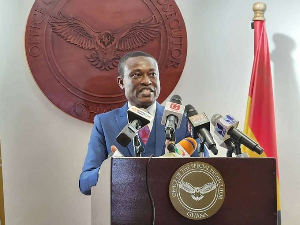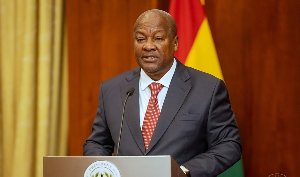Business News of Saturday, 4 June 2011
Source: Bank of Ghana
Government’s commercial borrowing rises
Ghana’s total external debt owed to commercial lenders grew by 19.7% to above US$1 billion in the 12 months to December 2010, according to data from the Bank of Ghana.
The figure includes the US$750 million borrowed from the international capital market in 2007 in the famous Eurobond issue, that was considerably oversubscribed and which is due for repayment in 2017.
Debts owed to multilateral creditors, including the World Bank and IMF, rose by 21.6% to US$2.99 billion, while bilateral debt grew by 24% to US$2.09 billion within the period.
Overall, the total external debt stock soared by 22% to US$6.1 billion, representing 20% of nominal GDP and an addition of US$1.1 billion between end-2009 and end-2010.
A recent string of three-year fixed-rate bonds issued by the Central Bank on behalf of the government saw strong foreign participation, which should add to the stock of commercial debt held externally.
With Ghana now a middle-income economy and showing improvements after recent macroeconomic challenges, its access to cheap multi-donor and multilateral financing looks set to decline, Ishac Diwan, World Bank Country Director, said recently.
“In all likelihood, multi-donor budget support (MDBS) financing will start declining in 2012,” the Bank’s economist told an annual review-meeting of the government and its development partners (DPs) in Accra recently.
“This is partly the result of a return to normalcy, after a surge to deal with the financial crisis since 2008.
But it is also a reflection of Ghana’s new middle-income status as well as budget difficulties in DP countries,” he explained.
Many expect the government, therefore, to boost its tax collections to fill the gap, and to rely more on commercially-sourced credit to shore up the budget and undertake development- financing.
For the third time this year, the Bank of Ghana is to issue a three-year fixed-rate bond to raise GH¢300 million for the government.
The bond’s auction took place yesterday and was available to both resident and non-resident investors.
In a previous auction in April to raise GH¢320 million, the offer was oversubscribed by 163%, with the Central Bank receiving bids totalling GH¢840.79 million from investors.
A uniform allocation rate of 12.39%, which is the maximum coupon rate payable on all bids, was determined at the time.
The cedi’s reaction was rather subdued following the announcement of the recent bond sale, with only a marginal appreciation against the dollar, according to a currency analyst at Gold Coast Securities, Yaw Adu-Koranteng, who explained that strong demand for the dollar appeared to have offset the upward pressure on the local currency.
The Central Bank has expressed some worry about volatile currency movements during the period of bond issues as non-resident investors initially move funds into the banking system to purchase the securities, and subsequently attempt to repatriate the leftover in the event of an over subscription.
These movements bring intermittent shocks to the currency market, causing unstable swings in the cedi’s exchange rate.
The pound and euro, meanwhile, have been trading strongly, reflecting global trends that are largely the outcome of a macroeconomic policy divergence between the United States and the Euro-zone.












